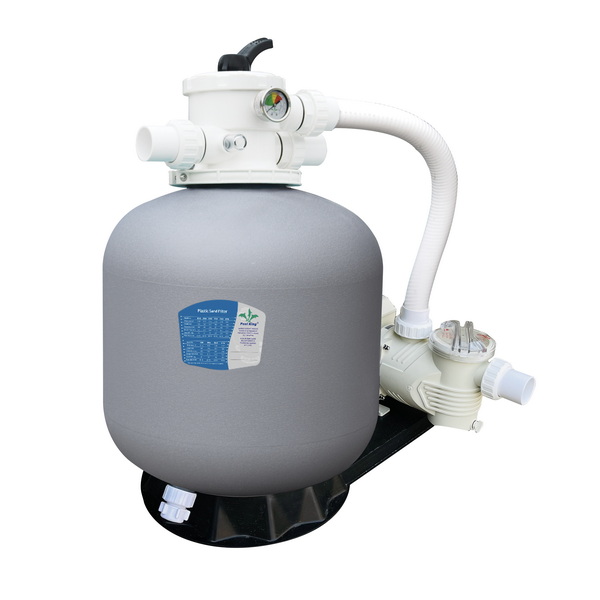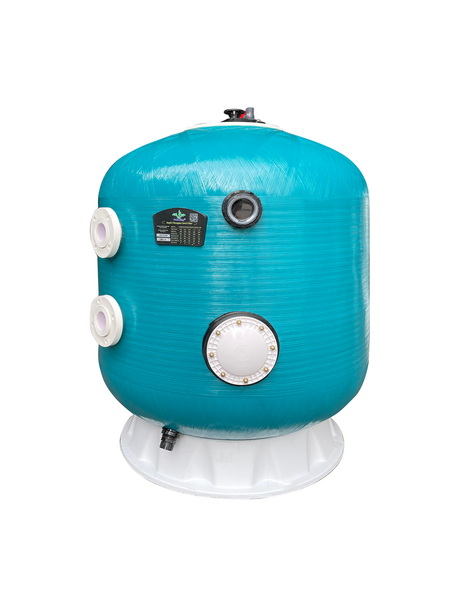Views: 222 Author: Tina Publish Time: 2025-08-26 Origin: Site








Content Menu
● Understanding Pool Sand Filters
● Types of Sand Used in Pool Filters
>> 1. Silica Sand (Quartz Sand)
>> 4. Other Media (Diatomaceous Earth & Cartridge Filters—Comparison)
● What Makes Sand Ideal for Pool Filters?
>> Grain Size
>> Grain Shape
>> Purity
● How to Choose the Best Sand for Your Pool Filter
>> Follow Manufacturer's Recommendations
>> Prioritize Industrial-Grade Silica Sand for Most Pools
>> Consider Alternative Media for Specialized Needs
>> Sand Quantity and Installation
● Installation and Maintenance Tips
>> Installing Pool Filter Sand
>> Troubleshooting Common Issues
● Frequently Asked Questions (FAQ)
>> Q1: Can I use beach sand in my pool filter?
>> Q2: How often should I replace the sand in my pool filter?
>> Q3: Is zeolite sand better than regular silica sand?
>> Q4: How much sand does a typical pool filter require?
>> Q5: Can I mix different types of sand or filter media?
>> Q6: How do I know if my sand filter sand is clogged?
>> Q7: Are there eco-friendly sand options for pool filters?
Maintaining crystal clear water in your swimming pool depends heavily on the quality and efficiency of your filtration system. One of the most critical components of a pool filtration system is the sand used in the sand filter. Choosing the right sand can improve filtration efficiency, extend the life of your equipment, and ensure healthier pool water. This article explores thoroughly: what is the best sand for a pool filter? We will cover the types of sand commonly used, ideal specifications, factors to consider when choosing sand, installation tips, maintenance practices, and answer frequently asked questions — all designed to help you make an informed decision that keeps your pool sparkling throughout the season.

Sand filters are among the most popular types of swimming pool filtration systems worldwide. These filters rely on sand as the filtering medium to trap and remove dirt, debris, algae spores, oils, and other impurities from the pool water. When pool water flows through the sand bed inside the filter tank, contaminants are mechanically trapped between sand granules, allowing clean water to be cycled back into the pool.
Sand filters are favored because of their simplicity, affordability, and low maintenance compared to other filtration methods. They work efficiently and are capable of capturing particles as small as 20-25 microns — an excellent barrier against most pool contaminants.
Although sand filters have been around for decades, not all sand types offer optimal filtration performance. The composition, grain size, shape, and purity of the sand make a significant difference in how well your pool filter works.
Silica sand is the most common and recommended filter media for pool sand filters. This sand is composed mainly of quartz granules and is specially graded for uniform particle size.
- Characteristics:
- Grain size typically between 0.45 - 0.55 mm.
- Rounded or slightly angular grains ideal for water flow and filtration.
- Provides excellent mechanical filtration, trapping particles down to about 20 microns.
- Widely available and cost-effective.
Zeolite is a naturally occurring volcanic mineral commonly used as an alternative filtration medium.
- Characteristics:
- Has a porous, honeycomb-like structure with a high surface area.
- Filters particles smaller than 10 microns.
- Acts as a natural ion exchanger, reducing nitrogen and ammonia levels.
- Slightly more expensive than silica sand but offers improved filtration performance.
This medium is made from recycled crushed glass and is increasingly gaining popularity for its environmental friendliness.
- Characteristics:
- Sharper edges help trap fine particles that traditional sand might miss.
- Filters down to 10-15 microns.
- Does not degrade or break down over time, potentially lasts longer.
- Requires less frequent backwashing and uses less water.
Although not sand types, it's useful to note that Diatomaceous Earth (DE) and Cartridge filters offer finer filtration but differ in maintenance complexity and cost.
- DE filters trap particles down to 3-5 microns but require handling of powder and periodic replacement.
- Cartridge filters use pleated polyester cartridges and offer easy maintenance but may have a higher initial cost.
Sand filters remain popular due to their balance between performance, ease of use, and reasonable cost.
Choosing the right sand involves understanding the physical and chemical properties that make sand effective for filtration.
A key factor is the grain size — the diameter of individual sand grains. Optimal pool filter sand grains typically measure between 0.45 and 0.55 millimeters. If grains are too small, they compact tightly and restrict water flow, risking clogs. If grains are too large or inconsistent, filtration efficiency decreases because water passes too quickly without proper filtering.
Sand grains can be rounded or angular. Rounded grains allow smoother water flow and reduce pressure build-up but filter less tightly. Angular grains with sharper edges can trap more debris but may compact more, potentially requiring more frequent maintenance.
Sand should be clean and free from organic materials, clay, or dust particles. Impure sand can introduce contaminants or discolor the pool water. Industrial-grade silica sand undergoes strict washing and grading to remove such impurities, ensuring stable filtration performance.
Ideal sand should resist fragmentation through the polarizing actions of water flow and pressure. Sand that breaks down into fine particles will clog filters and reduce their lifespan. High-quality silica sand or alternative media like recycled glass provide superior durability.
Filter sand should not react with pool chemicals such as chlorine, bromine, or pH balancers. Inert and pH-neutral sands avoid sudden water chemistry shifts that could irritate swimmers' skin or damage pool components.

Selecting the best sand involves evaluating your pool type, filter specifications, budget, and maintenance preferences.
Always start with the filtration system's manual or model specifications. The manufacturer will recommend a specific type and amount of sand to ensure optimal flow and filtration rates.
For most residential and commercial pools, high-quality industrial-grade silica sand that meets specification standards is the safest and most economical choice. Look for sand graded specifically for pool filtration purposes.
If your pool requires finer filtration for environmental reasons or you want to reduce water use from backwashing:
- Zeolite sand offers enhanced chemical filtration and can reduce maintenance intervals.
- Filter glass sand provides environmentally friendly, long-lasting media that traps smaller particles with less water usage.
Your filter tank size determines how much sand to use. Most residential filters hold between 50 and 100 pounds of sand. More sand doesn't always mean better filtration, so adhere strictly to recommended amounts to avoid channeling or flow restrictions.
Proper installation and upkeep are essential to maximizing the life and performance of your pool's sand filter.
1. Remove old sand: Fully drain your filter tank and dispose of the old sand following environmental guidelines.
2. Clean the tank: Rinse the inside of the filter tank and inspection ports to remove deposits or residues.
3. Add water: Fill the tank with several inches of water before adding sand to cushion and protect your filter laterals (the small perforated pipes that distribute water).
4. Slowly add new sand: Pour in the sand carefully to avoid damaging filter components. Level the sand surface evenly inside the tank.
5. Seal and test: Reassemble the filter system, check seals, and backwash the filter to remove any fine dust or particles remaining from installation.
- Backwash regularly: When the pressure gauge reads 8-10 psi above normal, backwash to clear accumulated dirt. This prevents clogging and maintains flow.
- Replace sand appropriately: Filter sand typically requires replacement every 5 to 7 years, although heavy pool use or contaminated water may shorten this duration.
- Inspect components: Periodically check laterals and pipes for cracks or sand leaks which reduce filtration efficiency.
- High filter pressure: Backwash or inspect for clogged sand.
- Cloudy water despite clean sand: Test water chemistry or consider alternative filtration improvements.
- Sand in the pool: Check for damaged filter laterals or excessive sand buildup.
Selecting the best sand for your pool filter is a foundational step in maintaining a clean, healthy swimming environment. While industrial-grade silica sand remains the top choice for most pool owners due to its cost-effectiveness and reliable performance, alternative media such as zeolite and filter glass sand provide advanced filtration capabilities that justify their higher cost in specific contexts.
Focusing on proper grain size, purity, and durability ensures your filtration system operates efficiently without clogging or damage. Coupling the right sand with correct installation, routine backwashing, and regular sand replacement maximizes filter longevity and pool water quality.
Choosing the right filter sand tailored to your pool's unique needs is an investment that pays dividends in healthier water, lower maintenance costs, and greater swim enjoyment. Always consult your filter manufacturer's guidelines and source high-quality sand to keep your pool sparkling year-round.

A: No. Beach sand contains salts, organic debris, and fine particles that can harm your filter and negatively affect water chemistry.
A: Generally, sand should be replaced every 5 to 7 years, depending on usage, water quality, and signs of wear such as reduced filtration efficiency or sand escaping into the pool.
A: Zeolite can filter finer particles and has chemical benefits such as reducing ammonia levels. However, it is more expensive, and the benefits only justify the cost in certain specialized pools.
A: Residential sand filters usually require between 50 to 100 pounds of sand. Always check your filter's manual to match the right volume.
A: Mixing media types is not recommended as it can cause uneven filtering, channeling, and potential damage to the system.
A: Signs include increased pressure on the gauge, slower water flow, and reduced filtration clarity. Backwash or replace the sand as needed.
A: Yes, filter glass sand made from recycled glass is environmentally friendly and offers exceptional filtration with less water waste during backwashing.
content is empty!
